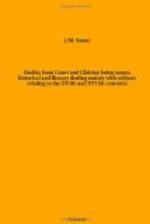One Generation of a Norfolk House, p. 62. Dr. Jessopp is mistaken in identifying this Mr. Jerningham with the friend and ally of Sir Henry Bedingfeld, who was associated with him in placing Mary on the throne. Sir Henry Jerningham died in 1572, aged 63, and Elizabeth’s host at Cossey was his son.
Among the Acts of the Privy Council for 1578, it is stated that:—“This day [August 24th], there appeared before their lordships, as warned by the Sheriff of Norfolk, amongst persons refusing to come to the church within that county, Sir Henry Bedingfeld, Knight, and Edmund Wyndham, Doctor of the Civil Law, who, standing in their obstinacy in refusing to come to the church in time of prayer, sermons, and other divine service, were ordered, as others of the same sort before, at Norwich: Sir Henry Bedingfeld to be bound in 500 pounds, and Mr. Wyndham in 200 pounds, with the like conditions as they that were bound to remain in their lodgings at Norwich, as by their obligations remaining in the Council Chest it may appear. And for that their lordships were informed that divers of the household servants of Sir Henry Bedingfeld did and do refuse likewise to come to the church, it was ordered that the Lord Bishop of Norwich, or some person appointed by him, should visit his household, and so many of his said servants as should refuse to conform themselves to come to the church should be discharged by the said Bishop or his visitors, in that case, from his service.”
The Council then wrote to two justices of the peace in Norfolk, ordering them to discharge Sir Henry’s servants “that will not come to church as is above said, and that they be not maintained by the said Sir Henry Bedingfeld nor any other of their friends with any exhibition or otherwise, wheresoever they shall bestow themselves, nor that there be not any other servants admitted to serve Sir Henry Bedingfeld in any place or office about him that shall be suspected to be of that disposition in religion.” On receiving an order to present himself before the Privy Council, Sir Henry, although suffering from illness, set out for London. This letter, signed by five of the members, met him on the road:—
“To our loving friend, Sir Henry Bedingfeld, Knight.
“After our hearty commendations. Whereas we are given to understand that upon some letters heretofore written, you are on the way repairing hither, forasmuch as we are informed by your son-in-law, Henry Seckford, that your sickness and infirmity is such as without danger you may not travel, we are very well contented if you shall not like to repair up, that you return again to the place where you were committed, there to remain until such time as further order shall be taken with you. And so fare you well.




